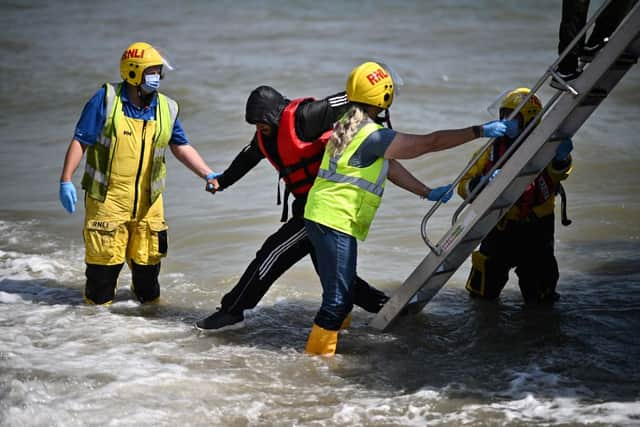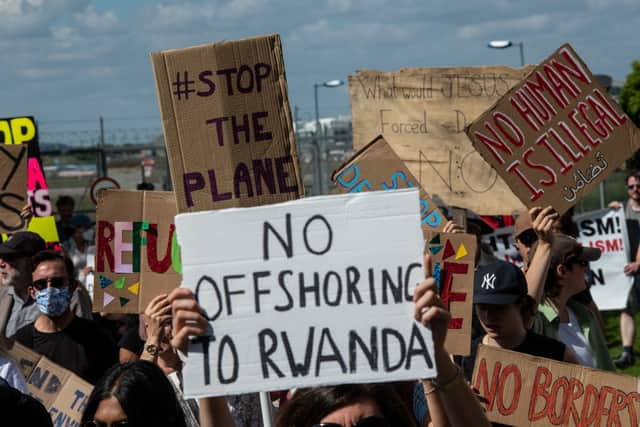Human Rights Act UK: 1998 act summary, what is Dominic Raab’s British Bill of Rights - and ECHR explained
and live on Freeview channel 276
According to Deputy Prime Minister Dominic Raab, a new British Bill of Rights will “restore a healthy dose of common sense” to the justice system.
Raab has said new legislation, which permits the government to disregard preliminary judgments rendered by the European Court of Human Rights and may make it easier to deport foreign criminals, will defend human rights.
Advertisement
Hide AdAdvertisement
Hide AdFollowing the Strasbourg court’s disruption of the Government’s divisive programme for asylum seekers who arrive via unauthorised travel to be deported to Rwanda, Raab presented the drought legislation to Parliament on Wednesday (22 June).
The Justice Secretary also sought to reassure the Commons that the UK will remain a party to the European Convention on Human Rights, an international accord that serves as the cornerstone of both human rights law and peace in Northern Ireland.
Raab stepped back from demands from some Conservative MPs to pull out of the European Convention on Human Rights entirely..
But Health Secretary Sajid Javid said “it’s right that UK law is supreme” with a new Bill of Rights.
Advertisement
Hide AdAdvertisement
Hide AdBut what is the new Bill of Rights, and what does it all mean?
Here is everything you need to know about it.
What does the new Bill of Rights propose?


To cut down on "trivial" cases, the proposed Bill would establish a permission stage in court where claimants would have to demonstrate they had sustained considerable harm before their case could proceed.
It would also seek to restrict the circumstances in which foreign-born people convicted of crimes are able to argue their right to family life trumps public safety in a bid to prevent their removal from the UK.
The plans, which require Parliament’s approval, require them to demonstrate that their deportation would cause their families severe and irreparable harm.
Advertisement
Hide AdAdvertisement
Hide AdThe Bill would also seek to protect Government plans to increase the use of separation centres for extremists from legal challenges based on the right to socialise.
The Ministry of Justice has also said the Bill would boost press freedom by introducing a stronger test for courts to consider before ordering journalists to disclose their sources.
Why has the new Bill been introduced?


Ministers initially anticipated roughly 130 passengers for the first flight forcibly removing asylum seekers to Rwanda on one-way tickets, which was scheduled to depart last week.
However, legal challenges reduced the manifest so that on the morning of takeoff, only around seven migrants were anticipated to be on board.
Advertisement
Hide AdAdvertisement
Hide AdThen the European court granted an interim injunction barring the removal of an Iraqi asylum seeker until a decision on the legality of the Government’s policy is made in UK courts.
Strasbourg-based judges removed two others from the plane, while the Supreme Court granted injunctions preventing the immediate removal of three more.
The legislation proposed by Raab would confirm that orders issued by the court under so-called ‘rule 39’ are not binding on UK courts.
What is the European Convention on Human Rights?
Raab backtracked on calls from certain Conservative MPs to completely withdraw from the European Convention on Human Rights, saying that the UK "intends to remain a state party" to the convention.
Advertisement
Hide AdAdvertisement
Hide AdThe European Convention on Human Rights (ECHR) is an international agreement to defend human rights and political liberties in Europe.
The agreement was established in 1950 by the then-new Council of Europe, and came into force in September 1953.
All of the Council of Europe’s member nations are party to the Convention, and future members are anticipated to ratify it as soon as possible.
The Convention established the European Court of Human Rights (ECtHR): any person can take a case to the Court if they believe that a state party has violated their rights under the Convention.
Advertisement
Hide AdAdvertisement
Hide AdThe concerned states are then required to carry out judgments if they are found to infringe the convention, and are obliged to do so.
Raab’s new Bill would replace the Human Rights Act 1998, an act of the British Parliament, which came into force from October 2000.
The act enshrines in law the rights outlined in the ECHR in UK legislation, and provides a solution for any violations of the Convention, without having to resort to the ECtHR in Strasbourg.
Comment Guidelines
National World encourages reader discussion on our stories. User feedback, insights and back-and-forth exchanges add a rich layer of context to reporting. Please review our Community Guidelines before commenting.
